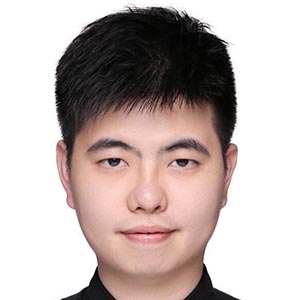Alum Dezhen Liu Cites Determination, Discipline, and Motivation as Keys to Success

Dezhen Liu (MET’22)
Actuarial Analyst at Aetna
MS, Financial Management
What do you find most fascinating about the discipline of financial management? Do you have a particular focus within the broader field?
Prior to beginning the MS in Financial Management program, I had acquired a strong foundation in mathematics and statistics through my previous actuarial science experience. The financial management program exceeded my expectations because the courses introduced the finance realm in a practical and comprehensive manner rather than focusing solely on formulas and theories. For example, in my Corporate Finance (MET AD 731) class, I was given the opportunity to build my own portfolios and compete against others on portfolio returns. That class provided me with invaluable experience.
Did you always intend on going back to school, or did the need arise at a particular moment?
I had always intended to return to school. Some may argue that a bachelor’s degree is sufficient for getting a job (particularly for actuaries), but pursuing a higher degree is never a bad idea. In my experience, my master’s degree not only qualified me for more job opportunities, but also broadened my career options by studying in another field. If I am tired of being an actuary in the future, I can always leverage my master’s in Financial Management and switch to a career in the financial industry.
Congratulations on your high achievement in the Financial Management (FM) program and your Award for Excellence in your studies! Looking back, what do you consider to be the main ingredients of your success?
To summarize, the ingredients of my success are determination, discipline, and motivation.
The first step is to be determined to succeed and enthusiastic about what you do. With a clear goal in mind, the next step is to anticipate what is required to get you there. For example, I discovered that strategically breaking down my main goal into a series of micro-objectives was beneficial. Micro-objectives can be getting a perfect score on your next homework assignment or acing your next quiz. Once I’ve established a set of clear and attainable goals, I will be disciplined and stick to my target—there is no reason to put off writing the essay if I can begin now. The sense of accomplishment that comes from completing each mini goal boosts my motivation even more, and that will lead to my ultimate success.
How were you able to successfully balance your studies with your commitments outside the classroom?
Having a plan, in my opinion, is essential for effectively managing study-life balance. I usually find it useful to make a list of weekly tasks and objectives, rank them from most important to least important, and estimate the time required to complete each task. I was able to spend my time more efficiently and wisely by focusing on more important tasks because of the plan.
Is there a particular course or project that enhanced your experience in the FM program?
I was lucky to be able to work on a master’s thesis with Professor Ivan Julio and Professor Alexander Becker. This research experience was extremely valuable to me because it not only opened the door to academia for me, but also allowed me to delve deeper into a field that interests me. Professor Julio and Professor Becker provided me with a well-designed curriculum for learning the field of corporate finance capital structures, and the knowledge I gained prepared me well for writing the thesis. I was grateful to be able to contribute my skill and knowledge to the finance field, and by sharing this experience, I was able to stand out from other candidates during job interviews.
How do you plan to apply the skills and competencies you gained during your studies moving forward? What is next in store for you?
As an actuary at Aetna, I will continue to apply the skills and knowledge gained from Boston University. Aside from working toward my professional actuarial designation, if given the opportunity, I am also hoping to leverage my research experience to gain admission to a PhD program in the financial engineering or corporate finance field.
You were recognized by faculty and peers for your hard work and dedication to the FM program. What “words of advice” or encouragement have served as a guiding principle, or simply inspiration, for you?
During my master’s thesis, I experienced anxiety and frustration when things did not go as anticipated. I began to doubt my abilities and became concerned about the future. Professor Becker and Professor Julio had given me a lot of encouragement, and it was typically this sentence that gave me strength to finish my thesis: “This thesis will give you a spectrum of options.” I was glad I listened to them because the thesis did provide me with additional opportunities and career options. The experience not only distinguishes me from my peer interview candidates and gets me the job, but it also provides me with additional career opportunities, such as being a researcher in the academic field or the finance industry.